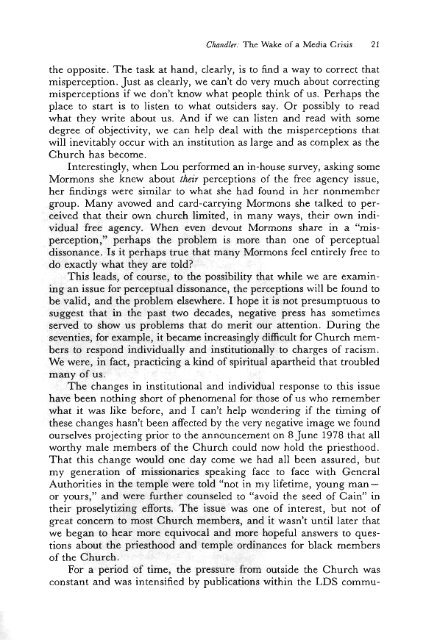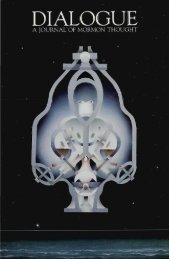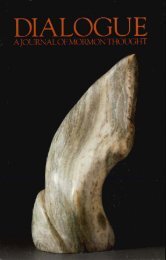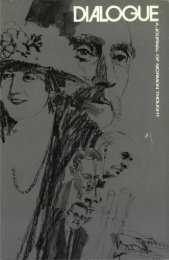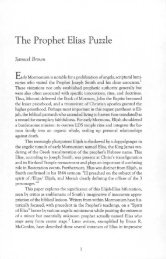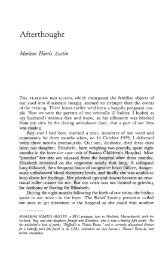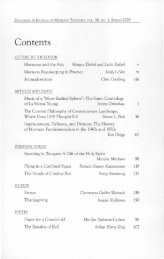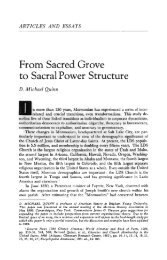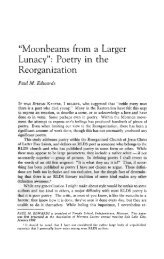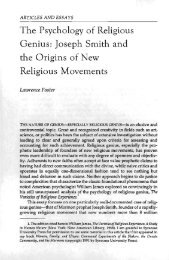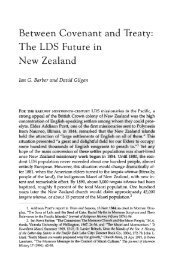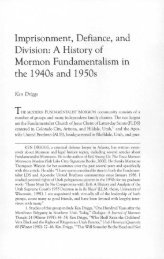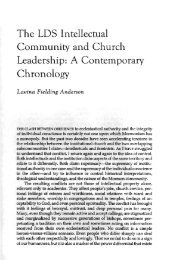Dialogue, Volume 25, Number 2 - Dialogue – A Journal of Mormon ...
Dialogue, Volume 25, Number 2 - Dialogue – A Journal of Mormon ...
Dialogue, Volume 25, Number 2 - Dialogue – A Journal of Mormon ...
You also want an ePaper? Increase the reach of your titles
YUMPU automatically turns print PDFs into web optimized ePapers that Google loves.
Chandler: The Wake <strong>of</strong> a Media Crisis 21<br />
the opposite. The task at hand, clearly, is to find a way to correct that<br />
misperception. Just as clearly, we can't do very much about correcting<br />
misperceptions if we don't know what people think <strong>of</strong> us. Perhaps the<br />
place to start is to listen to what outsiders say. Or possibly to read<br />
what they write about us. And if we can listen and read with some<br />
degree <strong>of</strong> objectivity, we can help deal with the misperceptions that<br />
will inevitably occur with an institution as large and as complex as the<br />
Church has become.<br />
Interestingly, when Lou performed an in-house survey, asking some<br />
<strong>Mormon</strong>s she knew about their perceptions <strong>of</strong> the free agency issue,<br />
her findings were similar to what she had found in her nonmember<br />
group. Many avowed and card-carrying <strong>Mormon</strong>s she talked to perceived<br />
that their own church limited, in many ways, their own individual<br />
free agency. When even devout <strong>Mormon</strong>s share in a "misperception,"<br />
perhaps the problem is more than one <strong>of</strong> perceptual<br />
dissonance. Is it perhaps true that many <strong>Mormon</strong>s feel entirely free to<br />
do exactly what they are told?<br />
This leads, <strong>of</strong> course, to the possibility that while we are examining<br />
an issue for perceptual dissonance, the perceptions will be found to<br />
be valid, and the problem elsewhere. I hope it is not presumptuous to<br />
suggest that in the past two decades, negative press has sometimes<br />
served to show us problems that do merit our attention. During the<br />
seventies, for example, it became increasingly difficult for Church members<br />
to respond individually and institutionally to charges <strong>of</strong> racism.<br />
We were, in fact, practicing a kind <strong>of</strong> spiritual apartheid that troubled<br />
many <strong>of</strong> us.<br />
The changes in institutional and individual response to this issue<br />
have been nothing short <strong>of</strong> phenomenal for those <strong>of</strong> us who remember<br />
what it was like before, and I can't help wondering if the timing <strong>of</strong><br />
these changes hasn't been affected by the very negative image we found<br />
ourselves projecting prior to the announcement on 8 June 1978 that all<br />
worthy male members <strong>of</strong> the Church could now hold the priesthood.<br />
That this change would one day come we had all been assured, but<br />
my generation <strong>of</strong> missionaries speaking face to face with General<br />
Authorities in the temple were told "not in my lifetime, young manor<br />
yours," and were further counseled to "avoid the seed <strong>of</strong> Cain" in<br />
their proselytizing efforts. The issue was one <strong>of</strong> interest, but not <strong>of</strong><br />
great concern to most Church members, and it wasn't until later that<br />
we began to hear more equivocal and more hopeful answers to questions<br />
about the priesthood and temple ordinances for black members<br />
<strong>of</strong> the Church.<br />
For a period <strong>of</strong> time, the pressure from outside the Church was<br />
constant and was intensified by publications within the LDS commu-


